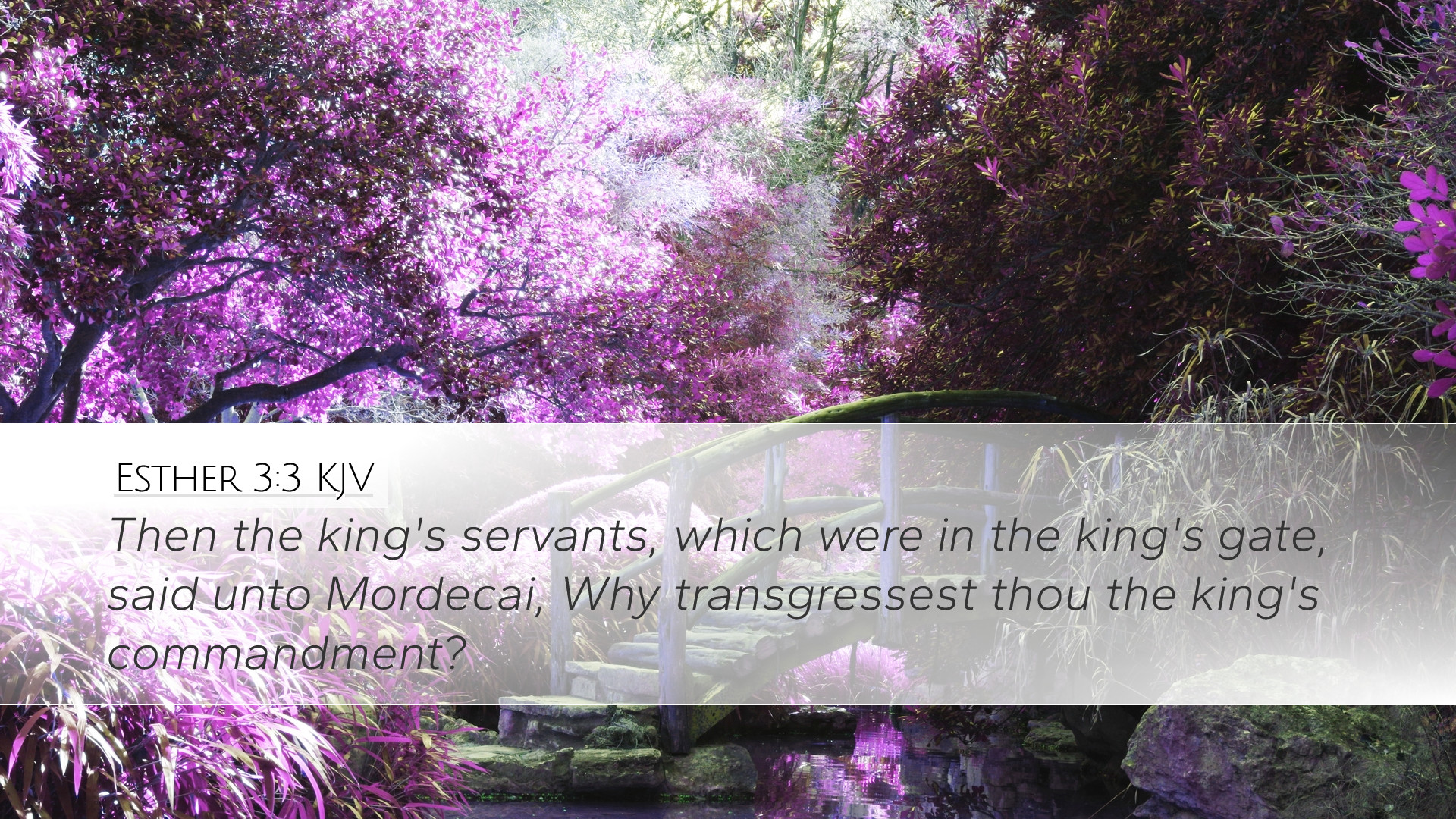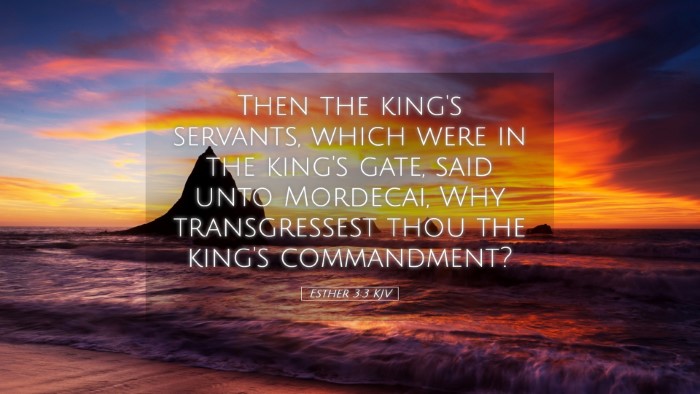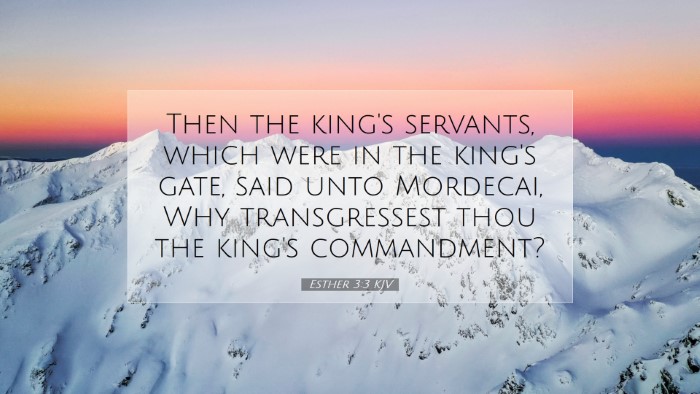Old Testament
Genesis Exodus Leviticus Numbers Deuteronomy Joshua Judges Ruth 1 Samuel 2 Samuel 1 Kings 2 Kings 1 Chronicles 2 Chronicles Ezra Nehemiah Esther Job Psalms Proverbs Ecclesiastes Song of Solomon Isaiah Jeremiah Lamentations Ezekiel Daniel Hosea Joel Amos Obadiah Jonah Micah Nahum Habakkuk Zephaniah Haggai Zechariah MalachiEsther 3:3
Esther 3:3 KJV
Then the king's servants, which were in the king's gate, said unto Mordecai, Why transgressest thou the king's commandment?
Esther 3:3 Bible Commentary
Commentary on Esther 3:3
Esther 3:3 states:
"Then the king’s servants who were within the king’s gate said to Mordecai, 'Why do you transgress the king’s command?'"
Context and Background
The book of Esther unfolds during the Jewish exile in Persia, a time marked by the challenges of maintaining cultural identity amidst oppression. Mordecai, a Jew, finds himself in peril when he refuses to bow to Haman, Agagite, highlighting the tension between loyalty to earthly authority and fidelity to God.
From the outset, it is essential to understand the role of Mordecai as not just a figure of resistance but as a catalyst for the unfolding events that ultimately lead to the Jewish people's deliverance. The "king's servants" play a pivotal role in applying pressure on Mordecai and in triggering the dramatic turn of events.
Insights from Public Domain Commentaries
Matthew Henry's Commentary
Matthew Henry highlights that the conflict begins on a personal level, as Mordecai's refusal to bow is a matter of principle and devotion to God. He notes:
"Mordecai’s disobedience to Haman was not merely personal but strongly rooted in his conviction of loyalty to Jehovah."
Henry suggests the societal implications of this act, emphasizing how Mordecai's stance challenges the status quo and invokes the ire of the Persian nobility, which points to the broader theme of the struggle between good and evil. The king’s gate symbolizes a place of judgment and authority where the conflict plays out.
Albert Barnes' Notes
Albert Barnes provides a detailed explanation regarding the motivations of the king's servants. He observes:
"These servants were concerned for the order and policy of the Persian court. Their question implies a disapproval of Mordecai’s actions, which they perceived as a threat to the king's authority."
Barnes connects the passage to the idea of fear and oppression, considering how fear of authority often leads individuals to become complicit in the actions of tyrants. He emphasizes Mordecai's moral courage as he stands against the prevailing norms.
Adam Clarke's Commentary
Adam Clarke, in addressing this verse, brings attention to the cultural dynamics within the Persian court, noting:
"The bowing to Haman was not merely an act of etiquette; it bore deep sociopolitical implications in Persian society."
Clarke emphasizes the significance of loyalty, arguing that Mordecai's defiance is emblematic of a greater spiritual battle. He suggests that Mordecai’s stand can be seen as a form of implicit resistance against idolatry, asserting that true allegiance belongs not to man but to God.
Theological Implications
This passage speaks profoundly to the relationship between faith and societal pressures. It compels believers to reflect on their own responses under similar circumstances, challenging them to consider where their allegiance lies. The refusal to bow before Haman emerges as a defining moment for Mordecai and sets the stage for divine intervention.
- Principle over Convenience: Mordecai's actions exemplify that faith often requires personal sacrifice and the courage to stand firm in one's beliefs, even at great risk.
- The Cost of Disobedience: The tension depicted in this verse illustrates the broader theme of suffering for righteousness, encouraging believers who face persecution for their faith.
- Divine Sovereignty: The unfolding events reflect God's sovereignty and purpose, laying the groundwork for the deliverance of His people despite apparent setbacks.
Conclusion
In conclusion, Esther 3:3 encapsulates the struggle between faithfulness to God and the pressure to conform to worldly expectations. It encourages reflection on the personal cost of discipleship and the unfurling providence of God in the face of adversity. Through Mordecai’s stand, we witness an enduring lesson: that true loyalty to God often defies earthly powers and potentially paves the way for redemption.
This commentary is intended to enrich the understanding of pastors, students, theologians, and Bible scholars by illuminating the text's complexity and encouraging deeper engagement with its implications for faith and obedience in the face of cultural challenges.


